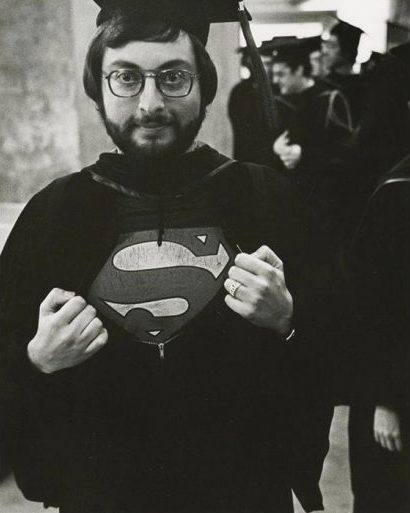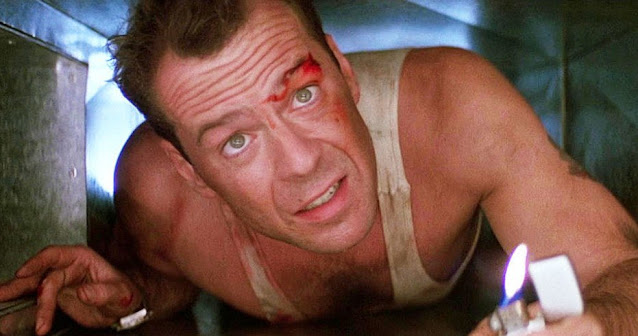Mike Uslan: The Godfather of the Batman Movie Franchise
In the early ‘70s, when future Batman producer Mike Uslan was an undergraduate at Indiana University, there was an experimental curriculum department in which students could pitch an alternative course, and – if a team of professors approved it – teach it on campus. Mike Uslan proposed a course on comic books, concentrating both on their legitimacy as an art form and their status as contemporary folklore, or modern-day mythology.
Uslan convinced the dubious professors that his proposal was legitimate by drawing parallels between the story of ‘Superman’ and that of ‘Moses.’ Then he made a call to a reporter at United Press International, posing as an outraged citizen whose tax dollars were being spent teaching about comic books. Soon his course was being discussed in all the newspapers, and the editors of Marvel Comics and DC Comics were calling Uslan to thank him for the free publicity. DC Comics soon asked him to come to New York for a meeting.
Mike Uslan had lived and breathed comic books since he was a boy, so he was thrilled. “Then, when I was at DC in New York, they offered me a summer job,” said Uslan. “So, one July day as I’m walking by the office of the editor of a comic book character called The Shadow, I hear him complaining loudly that he has no idea for a Shadow script due the very next day. Quickly, I poked my head into his office and blurted out, ‘I have an idea for a story.’ I didn’t. But I did realize here was a moment… a chance to get my foot in the door. Carpe Diem. I hemmed and hawed and created a story on the spot. The editor told me to have the script on his desk in 24 hours. Suddenly, I’m a comic book writer for DC Comics.”
“Two weeks later,” Uslan continued, “the editor of Batman comics passed by in the hallway. He was very gruff, but once you got to know him, he was a marshmallow inside. ‘Hey, kid,’ he said to me. ‘I read your Shadow script.’ ‘You did?’ I asked excitedly. ‘Yeah. It didn’t stink.’ ‘Oh, thank you!’ I beamed. And then he said, ‘How’d you like to take a shot at writing Batman?’ Well, since I was eight years old, I had dreamed of writing Batman. He was my favorite superhero, because he had no superpowers. His greatest superpower was his humanity… In my heart of hearts, I believed at age eight that if I studied hard, worked out, and if my Dad bought me a cool car, I could be this guy!”
 |
| Batman's Detective Comics No. 460 drawn by Neal Adams and written by Mike Uslan and Bob Rosakis |
“It was my lifelong ambition come true to write a couple of issues of Batman,” Mike Uslan marveled. “Then I began to think, ‘Wouldn’t it be great to do a definitive Batman movie, totally removed from the TV show, totally removed from camp – a version that went back to the original Bob Kane/Bill Finger strips?’”
Uslan believed that Batman needed rescuing, and he decided he was the man to do it. “I really wanted to see that creature of the night emerge and let the world at large see that there is more to Batman than ‘Pow!’ ‘Zap!’ and ‘Wham!’ For about 20 years, whenever anyone mentioned the word ‘Batman,’ ‘Pow!’ ‘Zap!’ and ‘Wham!’ were always attached to the name. I wanted to detach it and get back to the heart of the character.”
“One day, while staring out the window of my Bloomington apartment, I decided I wanted to get to Hollywood and produce a dark, serious Batman movie, the way he was created in 1939, as a creature of the night stalking criminals from the shadows,” Uslan recalled. “The president of DC Comics listened to my goal and tried to give me fatherly advice. ‘Michael,’ he said, ‘ever since the Batman TV show went off the air, no one’s been interested in Batman for movies. He’s as dead as a dodo. Go get credentials in the film business, then come back and talk to me.’”
Mike Uslan was not one to be thwarted so easily. “Unable to get my foot in the door creatively in Hollywood at a pay scale above starvation, I considered a different route, via law school. If I could become an entertainment lawyer as my entrée into the motion picture industry, learn how to finance and produce movies, and meet the power brokers in Hollywood, I could one day sneak in the back door of the creative side.”
It was a novel approach to getting a movie made, but Uslan embraced it immediately. “Indiana University School of Law allowed me to take an independent study course, since I was the only student interested in entertainment at that time. It was that independent study course that impressed United Artists studio honchos enough to give me, over some 200 applicants, the motion picture production attorney job they had open.”
At United Artists, Mike Uslan was given the opportunity to provide legal services for films like Raging Bull and Apocalypse Now. “I stayed at United Artists as if it was graduate school, learning all I could,” Uslan recalled. “Then, determined I would not be trapped into being a lawyer for the rest of my life, I found a partner and mentor in Ben Melniker, the former Executive Vice President of MGM in its heyday. Together, we raised money, went back to DC with my new credentials, and bought the rights to Batman in late 1979. Believing I had a 51% chance of success with Batman in my pocket, I rolled the dice and quit my job, becoming an independent movie producer by sneaking in that proverbial back door.”
So together Uslan and Melniker formed BatFilm Productions and got to work selling Batman to the studios. “I thought everyone in Hollywood would jump to finance my dark vision for Batman,” Uslan revealed. “Instead, I was turned down by every studio in town. The rejections piled up quickly – ‘Michael, you’re crazy! No one’s ever made a movie based on an old TV series. It’s never been done!’”
Though it took 10 more years before his dream became reality, Mike Uslan did get his chance to prove that ‘Batman,’ had more to him than ‘Pow!’ ‘Zap!’ and ‘Wham!’ To this day, Uslan and his partner Ben Melniker control the Batman franchise. In 2006, Mike Uslan reflected back on how, against all odds, he resurrected Batman as an entertainment icon, saying, “Sometimes you have to take calculated risks and roll the dice, or risk growing old and having to say, ‘I could have been…’ You have to follow whatever your passion may be in life, and do something you love.”
Michael Uslan, “Indiana University at Bloomington Commencement Address,” 5/6/06
Alan Jones, “Batman in Production,” Cinefantastique, 11/89
David Chmiel, “Sending Up the Bat Signal,” NJ Monthly, 11/05
Batman DVD, Shadows of the Bat DVD Bonus Material




Comments